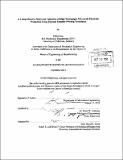A comprehensive study and validation of high-throughput microscale electrode production using thermal transfer printing techniques
Author(s)
Jain, Nikhil, M. Eng. Massachusetts Institute of Technology
DownloadFull printable version (15.70Mb)
Other Contributors
Massachusetts Institute of Technology. Dept. of Mechanical Engineering.
Advisor
Brian W. Anthony.
Terms of use
Metadata
Show full item recordAbstract
Adoption of Lab-on-Chip technology, which combines microfluidics with laboratory processes, is steadily increasing within the global health diagnostics field. An important element of this technology is the sensing and measurement capabilities of associated microelectronics. This thesis presents a critical analysis of the use of thermal transfer printing techniques for the manufacture of microscale electrical conductors used for biochemical assays- in this instance, cell lysate spectroscopy. This process affords advantages over traditional techniques such as chemical vapor deposition because of its compatibility with a variety of materials and ability to produce durable electrodes that can perform in the harsh environments that characterize many targeted areas where adequate access to laboratory diagnostic equipment is severely limited. Commercialization of the process to meet global demand is contingent upon the development of this process at its more rudimentary stages. This study attempts to validate the exponential scaling of this process, including qualification of manufacturing setup, optimization of operational parameters, and detailed analysis of full production runs. The maximization of sensitivity while simultaneously minimizing variation in electrode production presented the primary challenges of this work. It is concluded that a careful balance of process parameters can produce high quality, identical electrodes consistently at the thousands-level production throughput. A variation of only 2.2% in electrode sensitivity revealed that with the determined optimal process settings and in-line quality control, the success even further production scaling to better meet market demand is feasible.
Description
Thesis (M. Eng. in Manufacturing)--Massachusetts Institute of Technology, Dept. of Mechanical Engineering, 2012. Cataloged from PDF version of thesis. Includes bibliographical references (p. 101-103).
Date issued
2012Department
Massachusetts Institute of Technology. Department of Mechanical EngineeringPublisher
Massachusetts Institute of Technology
Keywords
Mechanical Engineering.